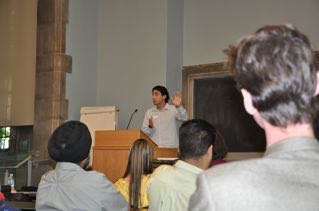What reading fiction teaches us about starting over

Do you read fiction? I tried to search google to find out how many books the average Canadian reads. In my own life, I know some people who always have a book on the go, and they might read somewhere between 20 and 50 books a year. Lots of others read a few books a year, and some mostly read periodicals. There's lots of evidence that reading fiction does good things for our emotional intelligence. But that's not why most people read novels. They read because they like to explore new experiences and perspectives through language. Reading a novel takes you into the lives of people who are like you and unlike you, and your response to the novel gives you new information about you (whether or not you liked it). Canada Reads finished yesterday. It's a kind of game show where 5 prominent Canadians each pick a book to represent in a battle to win the title of 'a book all Canada should read.' This year it featured an Olympian, an activist, a movie-maker, a wrestler tu...

